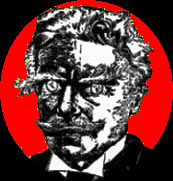 |
the AMBROSE BIERCE site |
|
God Knows I Had More Pleasure in the Other Dream by Don Swaim In his way, Ambrose Bierce must have loved his wife Mollie (Mary Ellen Day). Mollie, the daughter of a successful San Francisco mining family, died on April 27, 1905, a year after she filed for divorce in Los Angeles, and many years after their separation. They were married on December 25, 1871, in San Francisco. The couple brought three children into the world, two sons and a daughter. Bierce's wife and children are buried in St. Helena Cemetery in California. Bierce's remains are unknown. Perhaps Bierce was thinking of her six years after their wedding when he wrote his most beautiful poem, one with a tenderness unusual for an alleged misanthrope who once claimed that the decorative skull on his desk contained the ashes of a critic (or, depending on the anecdote, his departed son). Bierce could be a savage critic, but as this poem attests, he was not the misanthrope many claimed him to be, and was genuinely kind-hearted to his friends and affectionate toward his family.  Mollie While it is less known, in addition to his fiction, journalism, and humor, Bierce also wrote poetry. Some of it is in the flowery style one associates with the Victorian era. But his satirical verse is often scathing and hilarious, particularly his biting epitaphs of still living figures. The short poem below is neither flowery nor satirical, yet showcases Bierce's often-concealed senimentality and, indeed, affection, although the extent a writer of fiction or poetry writes autobiographically is often uncertain. Far too many assumptions are made regarding a writer's character, morals, or intentions based on his/her writing -- and that's been done to a near-criminal extent regarding Bierce. It's a simple premise, although expressed profoundly. Here, the poem's narrator dreams that his lover, who believes the narrator had been incapable of expressing his affection, places a rose upon his dead breast. He awakes from his dream, alive -- yet when she dies he wishes it had been he who had expired, not her. It's telling that the narrator does not dispute his lover's claim that it was "his way" to demonstrate his love "lightly," meaning not fully. I'm going on a limb here by speculating in the way I dismissed above, but could Bierce have conceded in this poem that he lacked the ability to fully reveal himself emotionally? by Ambrose Bierce
"Another Way" was first published in Bierce's column "Prattle" in November 1877 in the San Francisco Argonaut, and republished in his 1903 book of poetry, Shapes of Clay. [Thanks to the Joshi/Schultz duo for the bibliographic research on this.] More about the poetry of Ambrose Bierce by Jack Matthews HERE |
 |
the AMBROSE BIERCE site |